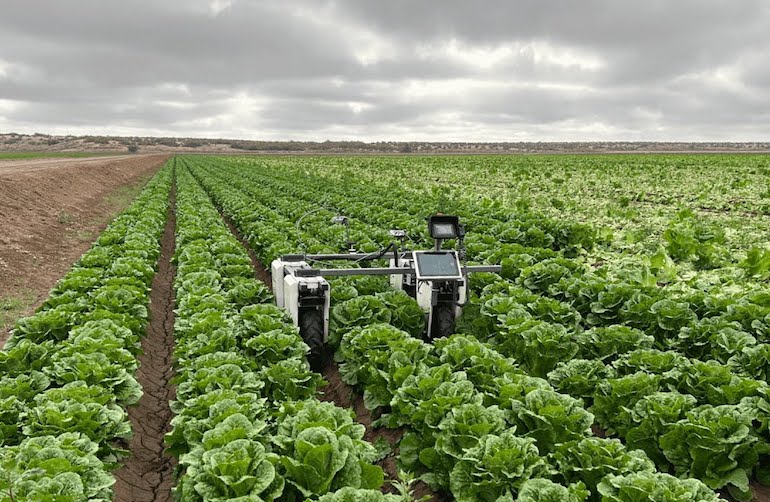Since the first industrial revolution two centuries ago, workers have moved into cities, even as population growth has challenged farmers to be increasingly productive. Today, farm-ng said it has completed its Series A funding round, raising more than $10 million to further develop the Amiga robot for agriculture.
“Growers face significant labor challenges,” noted the startup in a release. In the U.S. alone, $90 billion is spent on repetitive and hazardous manual farm tasks, and reduced immigration and rising wages exacerbate labor shortages, according to farm-ng. In addition, climate-related costs are thinning profit margins, and farm managers lack the data they need to make precise decisions and scale operations, it said.
Watsonville, Calif.-based farm-ng said its modular electric robot and onboard AI computer are intended to be affordable and adaptable, helping small to midsize farms be more productive, profitable, and sustainable. Amiga is built for multiple environments, tasks, and crops, and its open and extensible software allows for integration into farming applications and customization through developers and partners.
Amiga promises to boost farm productivity
farm-ng said it “is squarely focused on addressing the issues the farming industry experiences.” The company added that it “aims to deliver three game-changing outcomes” for customers with its mobile robot:
- Productive, resilient operations: With cost-effective systems, farms can significantly reduce manual labor, maintenance, and fuel costs. With automation, they can be more productive and resilient to labor shortages, economic shifts, and climate shocks.
- Inclusive, sustainable farming practices: The Amiga is simple for anyone on the farm to operate, asserted farm-ng. With automation of labor-intensive tasks, farms can operate more efficiently, increase yields, and invest in sustainable practices that deliver more profit to growers and healthier food to more people.
- Quick ROI with appropriate robotics and AI: Because the farm-ng platform is open and modular, farmers can easily customize it for various crop types, said farm-ng. Not only can the Amiga provide a quick return on investment, but it can also evolve with the operation over time, farm-ng said.
The Amiga won the 2023 Small Farm Innovation Challenge and was selected as a 2024 Top 10 New Product by World Ag Expo. In less than 18 months, farms have deployed more than 100 Amigas. They execute tasks ranging from seeding, precision spraying, pest management, and compost spreading to phenotyping and geo-tagged data collection, visualization, and analysis, said the company.

Amiga features include onboard AI. Source: farm-ng
farm-ng harvests capital
Acre Venture Partners led farm-ng’s Series A round with participation from Xplorer Capital, HawkTower, and 10 other institutional and individual investors. “This investment reflects the confidence and support of the investor community in farm-ng’s vision, strategy, and the potential for transformative impact on sustainable agriculture,” stated farm-ng.
“farm-ng has sold more robots in a short amount of time than nearly any other agtech startup, a testament to the quality of their robotics and AI solutions,” said Lucas Mann, co-founder and managing partner at Acre Venture Partners. “The company is led by a stellar team who deeply understand these technologies. Their strategy of collaborating with growers, researchers, developers, and partners to define their offerings has put them on farm with incredible speed.”
Ethan Rublee, founder and CEO of farm-ng, thanked the investors for their support.
“This Series A funding will enable us to accelerate manufacturing to meet market demand, fund the development of more autonomous farm capabilities, scale our go to market, and develop an ecosystem of applications that help farms thrive for generations to come,” he added. “At farm-ng, we are committed to cultivating a future where everyone has access to healthy food grown in an ecologically and economically sustainable way.”
“We made a seed investment in farm-ng because we saw its potential in transforming the farming industry in an immediate way,” said Jonathan McQueen, co-founder and managing partner at Xplorer Capital. “Ethan and his team didn’t prove us wrong. We are excited about the company’s momentum and the success it will realize with this Series A.”
The global market for agricultural robotics could expand from $14.97 billion in 2024 to $27.71 billion by 2029 at a compound annual growth rate (CAGR) of 13.1%, predicted Mordor Intelligence. It named North America as the largest market.
Similarly, Expert Market Research forecast a CAGR of about 16.7%, from $7.21 billion in 2023 to $28.96 billion by 2032. It cited robotics applications in field farming and the management of dairy farms, other livestock, soil, and crops.

